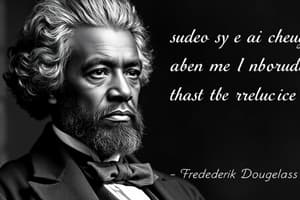Podcast
Questions and Answers
Why was Douglass sent for after the deaths of Captain Anthony and his son, Richard?
Why was Douglass sent for after the deaths of Captain Anthony and his son, Richard?
I was sent for to be valued as property-- it was a valuation of the property no will.
Who were the two living children who would inherit the property?
Who were the two living children who would inherit the property?
Andrew and daughter Lucretia.
What happened at the Valuation?
What happened at the Valuation?
We were all ranked together-- livestock, pigs, children subjected as the same examination-- fell to Lucretia portion.
How does Douglass describe his fellow slaves?
How does Douglass describe his fellow slaves?
To what does Douglass give credit for being given to Mrs. Lucretia as a slave?
To what does Douglass give credit for being given to Mrs. Lucretia as a slave?
What deepened Douglass's conviction of the infernal character of slavery?
What deepened Douglass's conviction of the infernal character of slavery?
Who was 'the slave's poet' and why?
Who was 'the slave's poet' and why?
Why was Douglass sent to St. Michael's?
Why was Douglass sent to St. Michael's?
To whom did Douglass feel the strongest attachment in Baltimore?
To whom did Douglass feel the strongest attachment in Baltimore?
Flashcards
Slaves as Property
Slaves as Property
Slaves were considered as commodities and property, like livestock.
Men and women of sorrow
Men and women of sorrow
A term Douglass used to describe the deep sorrow and suffering endured by enslaved people.
Ingratitude towards family
Ingratitude towards family
Highlights the disillusionment due to the mistreatment of family members and disregard for their emotional bonds.
The Slave's Poet
The Slave's Poet
Signup and view all the flashcards
Biblical Allusion
Biblical Allusion
Signup and view all the flashcards
Relocation as Punishment
Relocation as Punishment
Signup and view all the flashcards
Attachment and Connection
Attachment and Connection
Signup and view all the flashcards
Study Notes
Douglass's Experience and the Valuation of Property
- Douglass was summoned post the deaths of Captain Anthony and his son Richard for property valuation, indicating the consideration of slaves as commodities.
- The inheritors of the estate were Andrew Anthony and his daughter Lucretia.
The Valuation Process
- During the valuation, slaves were treated similarly to livestock, highlighting the dehumanizing nature of slavery.
- Douglass noted the examination of slaves reflected their status as property, with the outcome impacting Lucretia's share.
Grief and Suffering
- Douglass referred to fellow slaves as "men and women of sorrow," drawing a parallel to the Biblical description of suffering found in Isaiah 53:3.
- This term exemplifies the deep emotional and psychological anguish endured by those enslaved.
Kind Providence and Slavery
- Douglass credited "Kind Providence" for Mrs. Lucretia's treatment of slaves, suggesting that some aspects of their experience were influenced by benevolent circumstances.
Gratitude and Family Separation
- Douglass's disillusionment with slavery intensified due to the ingratitude shown towards his grandmother, who remained enslaved while witnessing her family divided without acknowledgment of their bonds.
- The emotional toll of being separated from family members was a central theme in Douglass's narrative of slavery.
The Slave's Poet
- Whittier, an American poet, was recognized as "the slave's poet" due to his prominent anti-slavery poems, including the poignant farewell of a Virginia slave mother to her daughters sold into bondage.
Biblical Allusion
- Douglass referenced the Biblical context of divine justice, hinting at accountability for the injustices faced by slaves as noted in Exodus 32:34.
Misunderstanding and Relocation
- A misunderstanding between Douglass and Master Hugh led to his relocation to St. Michaels as a form of punishment for his brother, underscoring the arbitrary exercise of power by slaveholders.
Attachment and Connection
- In Baltimore, Douglass developed a significant bond with local white boys, from whom he learned valuable lessons, making the prospect of leaving them particularly distressing.
Studying That Suits You
Use AI to generate personalized quizzes and flashcards to suit your learning preferences.




